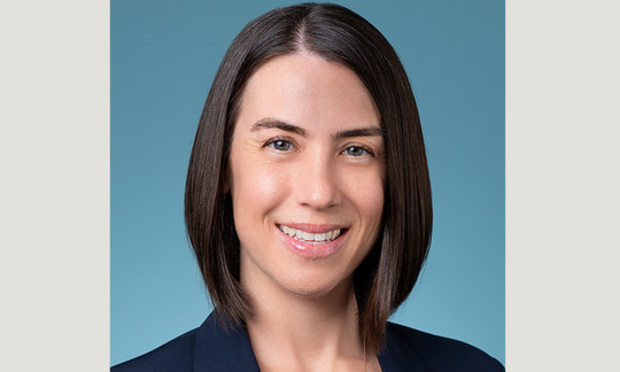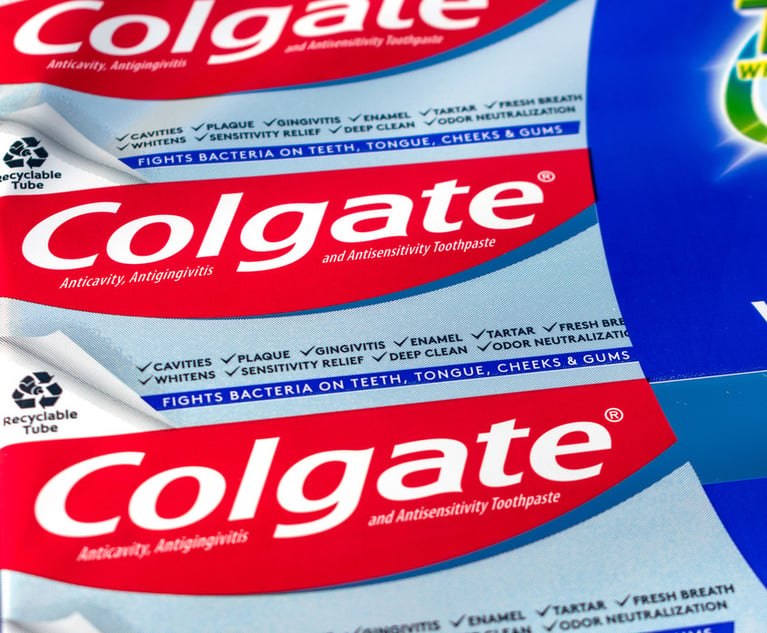The Intersection of the California Consumer Privacy Act and California's Preexisting Consumer Protection Statutes
The California Consumer Privacy Act (CCPA) contains an explicit prohibition, along with implicit safe harbors, likely to limit certain Unfair Competition Law and/or Consumer Legal Remedies Act claims related to the use or disclosure of information subject to the CCPA.
November 05, 2019 at 12:25 PM
6 minute read
 Kate Spelman, a partner in Jenner & Block's complex commercial litigation practice
Kate Spelman, a partner in Jenner & Block's complex commercial litigation practice
This is the first in the series of Consumer Law Watch columns from lawyers at Jenner & Block tracking the latest in privacy/cybersecurity, fintech, food & beverage, trade secrets, and other developments affecting consumer law in California.
With the close of the California state legislative session on Sept. 14, 2019, the final shape of the California Consumer Privacy Act (CCPA)—which is set to take effect on Jan. 1, 2020—came into focus. The most recent amendments included carve-outs for business-to-business contracts and employee records, though both sunset after a year. While the statutory language is settled for now, many questions remain about how it will be enforced. The Attorney General has issued proposed regulations clarifying some of this uncertainty. However, one issue that may be left for future judicial interpretation is the interplay between the CCPA and California's preexisting consumer protection statutes such as the Unfair Competition Law (UCL) and the Consumer Legal Remedies Act (CLRA). As discussed below, the CCPA contains an explicit prohibition, along with implicit safe harbors, likely to limit certain UCL and/or CLRA claims related to the use or disclosure of information subject to the CCPA.
The CCPA Likely Bars Derivative UCL Claims
The CCPA provides for enforcement by the Attorney General, but §1798.150(a) creates a private right of action for consumers whose personal information "is subject to an unauthorized access and exfiltration, theft, or disclosure as a result of the business's violation of the duty to implement and maintain reasonable security procedures and practices." Despite several legislative attempts to broaden the private right of action—which were supported by California's Attorney general—it is currently limited to "violations as defined in subdivision (a)," precluding CCPA claims related to violations of other statutory provisions. (Notably, the CCPA contains no express provision permitting attorney fees for prosecution of claims under §1798.150, though plaintiffs' attorneys may argue that such fees should be awarded as "other relief the court deems proper" (§1798.150(a)(1)(C)), or pursuant to the private attorney general attorney fee statute, CCP §1021.5.)
Given the narrow private right of action in the CCPA, consumers may seek an indirect route to CCPA liability under the "unlawful" prong of the UCL, which prohibits business practices that violate another law. However, §1798.150(c) of the CCPA states that "[n]othing in this title shall be interpreted to serve as the basis for a private right of action under any other law." While California courts have held that the absence of a statutory private right of action does not preclude derivative UCL liability, a plaintiff may not "plead around an absolute bar to relief simply by recasting the cause of action as one for unfair competition." Cel-Tech Commc'ns v. Los Angeles Cellular Tel. Co., 20 Cal. 4th 163, 182 (1999) (emphasis added). In other words, statutes that explicitly preclude private rights of action cannot be enforced through the UCL. For this reason, courts have rejected UCL "unlawful" claims where, for example, the predicate statute expressly exempted the defendants from liability for the alleged violation at issue, or stated that it was "not intended to create new civil causes of action." Hobby Indus. Assn. of Am. v. Younger, 101 Cal. App. 3d 358, 370 (1980); LegalForce RAPC Worldwide P.C. v. UpCounsel, No. 18-02573, 2019 WL 160335, at *16 (N.D. Cal. Jan. 10, 2019). The CCPA's admonition that the statute not be interpreted to "serve as the basis for a private right of action under any other law" is a strong basis on which a court could preclude UCL claims based on the same rationale.
Separate and apart from the statutory bar, consumers may lack standing to seek redress under the UCL for violations of the CCPA. This is because the UCL requires proof that a plaintiff "has lost money or property as a result of the unfair competition" (Cal. Bus. & Prof. Code §17204), and a plaintiff may need to allege something more than, for example, the unlawful collection or sale of her personal information to satisfy this requirement.
The CCPA May Provide 'Safe Harbor' Protections Against Other Consumer Protection Claims
Even assuming a bar against UCL "unlawful" claims based on express CCPA violations, consumers may assert UCL or CLRA claims based on allegedly unfair or deceptive conduct related to the collection, sale, or disclosure of personal information when such conduct does not directly violate the CCPA. In those cases, compliance with the CCPA could defeat UCL or CLRA claims that implicate conduct permitted by the CCPA or its implementing regulations, since the California Supreme Court has held that "[w]hen specific legislation provides a 'safe harbor,' plaintiffs may not use the general unfair competition law to assault that harbor." Cel-Tech Commc'ns, 20 Cal. 4th at 182; see also Alvarez v. Chevron, 656 F.3d 925, 934 (9th Cir. 2011) (safe harbor provisions of California regulations prohibited CLRA claim). For example, a UCL or CLRA claim related to a business' allegedly deceptive sale of consumers' personal information to third parties may be barred by the business's provision of a "clear and conspicuous" opt-out link on its Internet homepage in compliance with CCPA §1798.135(a). Additionally, a UCL or CLRA claim related to a business' practice of charging more to consumers who prohibit that business from selling their personal information may be precluded if the difference is "reasonably related to the value provided to the business by the consumer's data," as permitted by CCPA §1798.125.
Thus, while the CCPA imposes new and arguably stringent requirements for businesses handling personal information, compliance with those requirements could provide protection against UCL and CLRA lawsuits regarding the allegedly deceptive treatment of consumers' personal information.
Kate Spelman is a partner in Jenner & Block's complex commercial litigation practice who represents clients in consumer class actions, commercial disputes and professional liability matters.
This content has been archived. It is available through our partners, LexisNexis® and Bloomberg Law.
To view this content, please continue to their sites.
Not a Lexis Subscriber?
Subscribe Now
Not a Bloomberg Law Subscriber?
Subscribe Now
NOT FOR REPRINT
© 2025 ALM Global, LLC, All Rights Reserved. Request academic re-use from www.copyright.com. All other uses, submit a request to [email protected]. For more information visit Asset & Logo Licensing.
You Might Like
View All



Colgate Faces Class Actions Over ‘Deceptive Marketing’ of Children’s Toothpaste
Trending Stories
Who Got The Work
J. Brugh Lower of Gibbons has entered an appearance for industrial equipment supplier Devco Corporation in a pending trademark infringement lawsuit. The suit, accusing the defendant of selling knock-off Graco products, was filed Dec. 18 in New Jersey District Court by Rivkin Radler on behalf of Graco Inc. and Graco Minnesota. The case, assigned to U.S. District Judge Zahid N. Quraishi, is 3:24-cv-11294, Graco Inc. et al v. Devco Corporation.
Who Got The Work
Rebecca Maller-Stein and Kent A. Yalowitz of Arnold & Porter Kaye Scholer have entered their appearances for Hanaco Venture Capital and its executives, Lior Prosor and David Frankel, in a pending securities lawsuit. The action, filed on Dec. 24 in New York Southern District Court by Zell, Aron & Co. on behalf of Goldeneye Advisors, accuses the defendants of negligently and fraudulently managing the plaintiff's $1 million investment. The case, assigned to U.S. District Judge Vernon S. Broderick, is 1:24-cv-09918, Goldeneye Advisors, LLC v. Hanaco Venture Capital, Ltd. et al.
Who Got The Work
Attorneys from A&O Shearman has stepped in as defense counsel for Toronto-Dominion Bank and other defendants in a pending securities class action. The suit, filed Dec. 11 in New York Southern District Court by Bleichmar Fonti & Auld, accuses the defendants of concealing the bank's 'pervasive' deficiencies in regards to its compliance with the Bank Secrecy Act and the quality of its anti-money laundering controls. The case, assigned to U.S. District Judge Arun Subramanian, is 1:24-cv-09445, Gonzalez v. The Toronto-Dominion Bank et al.
Who Got The Work
Crown Castle International, a Pennsylvania company providing shared communications infrastructure, has turned to Luke D. Wolf of Gordon Rees Scully Mansukhani to fend off a pending breach-of-contract lawsuit. The court action, filed Nov. 25 in Michigan Eastern District Court by Hooper Hathaway PC on behalf of The Town Residences LLC, accuses Crown Castle of failing to transfer approximately $30,000 in utility payments from T-Mobile in breach of a roof-top lease and assignment agreement. The case, assigned to U.S. District Judge Susan K. Declercq, is 2:24-cv-13131, The Town Residences LLC v. T-Mobile US, Inc. et al.
Who Got The Work
Wilfred P. Coronato and Daniel M. Schwartz of McCarter & English have stepped in as defense counsel to Electrolux Home Products Inc. in a pending product liability lawsuit. The court action, filed Nov. 26 in New York Eastern District Court by Poulos Lopiccolo PC and Nagel Rice LLP on behalf of David Stern, alleges that the defendant's refrigerators’ drawers and shelving repeatedly break and fall apart within months after purchase. The case, assigned to U.S. District Judge Joan M. Azrack, is 2:24-cv-08204, Stern v. Electrolux Home Products, Inc.
Featured Firms
Law Offices of Gary Martin Hays & Associates, P.C.
(470) 294-1674
Law Offices of Mark E. Salomone
(857) 444-6468
Smith & Hassler
(713) 739-1250






